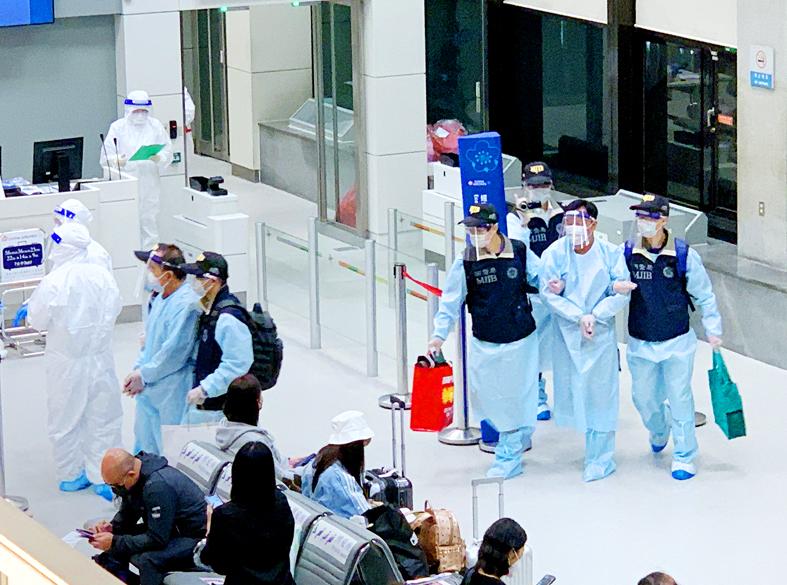Two Taiwanese men who were jailed in Eswatini after being convicted of attempting to smuggle rhino horns out of the southern African country in 2017 were repatriated on Thursday evening to serve the remainder of their sentence.
Escorted by a six-member team from the Investigation Bureau, the men, surnamed Hsiao (蕭) and Chen (陳), arrived at Taiwan Taoyuan International Airport at 7:10pm after a transfer flight from Bangkok.
After Hsiao and Chen tested negative for COVID-19 in polymerase chain reaction tests upon arrival, they were transported to Taichung Detention Center, where they are to quarantine before being transferred to prison.

Photo: CNA
After serving five years of an 11-year jail sentence, the men were granted commuted sentences, which end at the end of the year, by the Eswatini government, the bureau said.
The men had attempted to smuggle NT$72 million (US$2.54 million at the current exchange rate) worth of rhino horns in their luggage from Eswatini to Taiwan, the bureau said.
An Agence de Presse Africaine report at the time said they were on Feb. 25, 2017, apprehended at King Mswati III International Airport with 24 pieces of chopped rhino horns from four killed animals.
Their repatriation was made possible by a bilateral prisoner-transfer agreement signed between Taiwan and the Kingdom of Eswatini in February 2019, in the first such agreement Taiwan has signed with an African country, the bureau said.
Under the pact, convicted offenders can be repatriated to serve out their sentences, while enforcement of the remaining prison time would be overseen by their home country, with authorities informing their counterparts when an inmate has completed their term or received conditional release.
Following the prisoner-transfer agreement and pleas from their family members that Hsiao and Chen could serve their jail terms in Taiwan, the bureau said that the Ministry of Justice began seeking their repatriation in 2020, but the plan was postponed due to the COVID-19 pandemic.

ALIGNED THINKING: Taiwan and Japan have a mutual interest in trade, culture and engineering, and can work together for stability, Cho Jung-tai said Taiwan and Japan are two like-minded countries willing to work together to form a “safety barrier” in the Indo-Pacific region, Premier Cho Jung-tai (卓榮泰) yesterday said at the opening ceremony of the 35th Taiwan-Japan Modern Engineering and Technology Symposium in Taipei. Taiwan and Japan are close geographically and closer emotionally, he added. Citing the overflowing of a barrier lake in the Mataian River (馬太鞍溪) in September, Cho said the submersible water level sensors given by Japan during the disaster helped Taiwan monitor the lake’s water levels more accurately. Japan also provided a lot of vaccines early in the outbreak of the COVID-19 pandemic,

Kaohsiung Mayor Chen Chi-mai (陳其邁) on Monday announced light shows and themed traffic lights to welcome fans of South Korean pop group Twice to the port city. The group is to play Kaohsiung on Saturday as part of its “This Is For” world tour. It would be the group’s first performance in Taiwan since its debut 10 years ago. The all-female group consists of five South Koreans, three Japanese and Tainan’s Chou Tzu-yu (周子瑜), the first Taiwan-born and raised member of a South Korean girl group. To promote the group’s arrival, the city has been holding a series of events, including a pop-up

TEMPORAL/SPIRITUAL: Beijing’s claim that the next Buddhist leader must come from China is a heavy-handed political maneuver that will fall flat-faced, experts said China’s requirement that the Dalai Lama’s reincarnation to be born in China and approved by Beijing has drawn criticism, with experts at a forum in Taipei yesterday saying that if Beijing were to put forth its own Dalai Lama, the person would not be recognized by the Tibetan Buddhist community. The experts made a remarks at the two-day forum hosted by the Tibet Religious Foundation of His Holiness the Dalai Lama titled: “The Snow Land Forum: Finding Common Ground on Tibet.” China says it has the right to determine the Dalai Lama’s reincarnation, as it claims sovereignty over Tibet since ancient times,

Temperatures in some parts of Taiwan are expected to fall sharply to lows of 15°C later this week as seasonal northeasterly winds strengthen, the Central Weather Administration (CWA) said today. It is to be the strongest cold wave to affect northern Taiwan this autumn, while Chiayi County in the southwest and some parts of central Taiwan are likely to also see lower temperatures due to radiational cooling, which occurs under conditions of clear skies, light winds and dry weather, the CWA said. Across Taiwan, temperatures are to fall gradually this week, dropping to 15°C to 16°C in the early hours of Wednesday